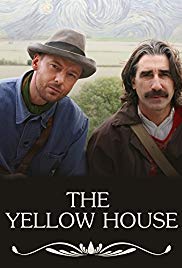
THE YELLOW HOUSE
UK, 2007, 85 minutes. Colour.
John Simm, John Lynch, Scott Handy.
Directed by Chris Durlacher.
The Yellow House refers to the house that Vincent Van Gogh rented in Arles in 1879. He shared it for some weeks with painter Paul Gauguin. They were supported financially by Van Gogh’s brother, Theo. While the period was very productive in terms of art (and the film at the end gives the millions of dollars value of the works produced during this period), Gauguin sold some works but Van Gogh none.
The relationship between the two was quite stormy, Gauguin being quite dominating. Van Gogh is a moody young man, completely devoted to his art, but depressed, drinking, influenced by the womanising of Gauguin. They eventually break their friendship and Gauguin goes back to report to Theo Van Gogh about the experiment. Van Gogh then becomes even more depressed, slices of his ear and ultimately commits suicide.
The film shows quite a number of the paintings of the two artists – Van Gogh standing out. Audiences will be familiar with many of the paintings they see and will be interested in the context in which they were painted.
John Simm is a young Van Gogh, with his inner demons, with great ambitions to be a successful painter – but not in monetary terms. Gauguin, with his greater experience and contacts, is more worldly-wise. After this experience he returned to Tahiti and the Pacific.
There are many films about Van Gogh, the most popular being Lust for Life with Kirk Douglas as Van Gogh and Anthony Quinn as Gauguin. There was also a film by Robert Altman about Theo Van Gogh and his relationship to his brother, starring Tim Roth. The same year, 1990, saw Maurice Pialat’s film Van Gogh with Jacques Dutronc as the painter. There was also a more contemporary film story with flashbacks to Van Gogh, Vincent et Moi where he was played by Tcheky Karyo. Also in 1990, Akira Kurosawa’s Dreams was released and Martin Scorsese played the painter in an episode.
Gauguin was played by David Carradine in Gauguin the Savage (1980), by Donald Sutherland in The Wolf at the Door (1986) and by his son Kiefer Sutherland in Paradise Found (2003, an Australian/British production).
1. Audience interest in the work of Van Gogh, admiring his art, the puzzles about his life, his lack of success during his lifetime, his death?
2. Audience interest in Paul Gauguin, his art, the time with Van Gogh? His life in Tahiti?
3. The film and television traditions, the variety of interpretations?
4. The title, the focus on the yellow house, Van Gogh and his house in Arles, his going to Provence, his hopes for developing his art? An art colony?
5. The idea of the colony, Gauguin and Van Gogh working together, sharing the life, a new involvement in art, a new movement?
6. Gauguin and his reputation, Theo Van Gogh and his concern about his brother, paying for Gauguin to stay in the yellow house? The sequences of the reports by Gauguin to Theo?
7. The structure of the film, Gauguin, his reports, the discussions, the explanations, his self-justification, the puzzle about Van Gogh and his personality and his art?
8. Gauguin’s arrival, the inn, meeting Van Gogh, going to the house, the criticism of the yellow house, the rooms, Gauguin taking over Van Gogh’s room, the point about bringing women secretly to the house? Van Gogh agreeing? Van Gogh as an intuitive type, not anchored in the day-by-day reality?
9. The work together, Van Gogh and the ordinary things in the house, the painting subjects, the chairs, the sunflowers? His method, his work, his not wanting to lose any time? Working in his studio (and Gauguin’s criticism of the studio) and in the countryside?
10. Gauguin and his method, the professional artist, disagreeing with Van Gogh, patronising him?
11. The tensions, the drinking, Gauguin and his women, the inn and the dancing, Van Gogh and the women, his not having a need for women, his being pressurised by Gauguin?
12. The clashes, the reconciliations, going out in the countryside? Gauguin’s dismissive attitude?
13. Gauguin, leaving, his report, his future? The contrast with Van Gogh, sadness, slicing his ear, killing himself?
14. The final information about the paintings and their money worth at the beginning of the 21st century?